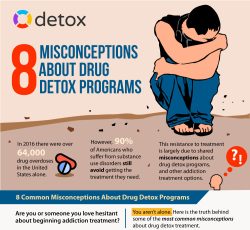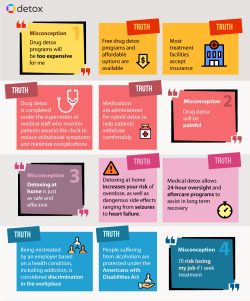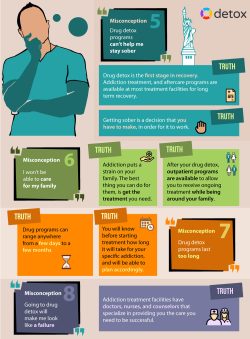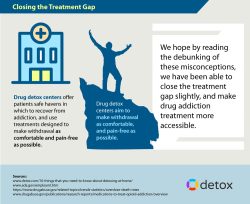8 Misconceptions About Drug Detox Programs
Detox is the first stage of addiction treatment, and helps individuals overcome physical dependence on drugs, alcohol, and all other substances. The drug detox process can seem incredibly scary to those who suffer from addiction — especially since withdrawing from drugs and alcohol can cause unpleasant symptoms such as vomiting, bone aches, and insomnia.
Because of the stigma surrounding the concept of drug detox, many individuals try quitting on their own without professional help — putting themselves at risk for relapse, overdose, and death. Others decide to stay caught up in the cycle of addiction just for the sake of avoiding cravings and other intense symptoms.
The U.S. overdose fatality rate has increased 137% since the year 2000.
Despite the fact that addiction is widely recognized and defined as a chronic relapsing brain disease in the U.S., roughly 90 percent of all Americans who suffer substance use disorders avoid seeking treatment. A large percentage of these individuals still believe that drug detox is comparable to going to prison or a mental institution, and that they’ll be made to fend for themselves and suffer tremendously as they withdraw from drugs and alcohol. But in reality, drug detox centers offer patients safe havens in which to recover from addiction, and use treatments designed to make withdrawal as comfortable and pain-free as possible.
Are you hesitant about starting a drug detox program? Here are eight common misconceptions about drug detox, and the truth behind how detox treatments can help you or your loved one safely overcome chemical dependency and addiction.

Misconception #1: Drug Detox Programs Are Too Costly For Me
Financial struggles and hardships are among the most common signs of addiction. Many who suffer from addiction tend to spend exorbitant amounts of money on drugs and alcohol, and may fall behind on rent, mortgage, and other important bills. Some even make impulsive purchases while under the influence, or suffer co-occurring disorders like shopping addiction that further drain their savings accounts.
Those who need help recovering from addiction sometimes lack the funds needed to pay for drug detox upfront, and assume they won’t be able to receive treatment. Fortunately, many detox centers understand the financial struggles these individuals may be facing, and offer a range of payment options to accommodate those who need help.
Many drug detox centers accept health insurance, and offer multiple payment options to those without coverage. Scholarships, grants, and sliding scale payment systems are also available to those who need help paying for detox treatment. Some patients even qualify for free detox treatment on behalf of federal and state subsidies.
If you or your loved one needs help finding an affordable detox center, call our 24/7 confidential helpline at 800-996-6135(Who Answers?) . Our treatment specialists will discuss your detox options and connect you with affordable treatment.
Misconception #2: Drug Detox Will Be Painful
In the movies and on TV, withdrawing from drugs and alcohol is made out to be severely painful, unpleasant, and agonizing. Characters are strapped and secured to cots in cold, sterile rooms, and left alone to endure withdrawal for days on end without help or assistance. However, scenarios such as these only happen in Hollywood, and are nothing compared to today’s real-life drug detox treatments.
Traditionally, drug detox is performed under the care and supervision of medical staff who monitor patients around the clock to minimize the risk for complications, and to reduce the severity of withdrawal symptoms. This type of detox is known as a medical detox, and often involves the use of medications that help relieve withdrawal symptoms. For instance, an anticonvulsant medication known as gabapentin is commonly prescribed to those with marijuana use disorder to reduce sleeplessness and insomnia.
Heroin and painkillers are among the most difficult drugs to withdraw from on your own without professional treatment due to the severity of withdrawal symptoms. At drug detox centers, opioid dependence is commonly treated using medications that mirror the effects of heroin and painkillers without euphoria so patients can withdraw from these drugs comfortably with reduced symptoms.
A major benefit to undergoing professional detox treatment is being able to recover from drug dependency without suffering intense, painful withdrawal symptoms. Nurses and doctors are available to relieve your symptoms, and to make sure your recovery is as comfortable as possible. Going through drug detox is often much safer and far less riskier than withdrawing from drugs and alcohol on your own without help.

Misconception #3: Detoxing at Home is Just as Safe and Effective
Many who fight addiction are under the impression they can detox just as easily at home as they could at a treatment center, while saving lots of time and money in the process. But detoxing at home comes with countless risks that vary based on factors such as the substance being used, the severity of the addiction, and one’s current health status. Detoxing at home increases the risk for relapse and overdose, and for health complications that range from seizures, to psychosis, to heart failure.
For addiction types involving prescription drugs like stimulants and benzodiazepines, individuals must taper off the drugs slowly and gradually over time to reduce the risk for seizures and heart problems, along with psychological symptoms of anxiety, depression, and suicidal thoughts. Tapering is safe and most effective when conducted by doctors and nurses with backgrounds in addiction treatment.
Many at-home drug detox kits are not approved or regulated by the FDA for use in treating drug dependency, and may be ineffective. At-home detox kits are also often associated with higher relapse rates due to their inability to fully reduce cravings and other symptoms. Some kits may be effective at flushing out toxins and waste from the body, but fail to offer relief for withdrawal symptoms like the medications used in professional drug detox treatments.
Those who try quitting alcohol cold turkey at home can experience delirium tremens or DT — a severe form of alcohol withdrawal that causes sudden, severe changes to the brain and central nervous system. DT is considered a life-threatening medical emergency, and can lead to seizures, rapid heartbeat, and intense, rapid muscle tremors.
Detoxing alone can lead to relapse and a potentially fatal overdose. Get the help you need today!
Misconception #4: I’ll Risk Losing My Job if I Seek Treatment
It’s completely rational to worry about losing your job if you decide to seek drug detox treatment. You may worry that your boss or employer will think you’re incompetent, or that you’ll lose out on future promotions. However, if you continue suffering from addiction without getting help, you not only risk losing your job, but everything else as well — including your life.
Many employers allow workers to take an unpaid leave of absence for up to 12 weeks per year under the Family and Medical Leave Act. Using vacation time for a paid leave of absence is also an option for those who need drug detox. In most cases, employees are not required to inform employers about their personal health conditions, including addiction.
Mistreating employees based on their health and medical conditions is considered discrimination in many workplaces. Those who suffer from alcohol use disorder are protected under the Americans with Disabilities Act, which prevents employers from discriminating against those with disabilities — including alcohol addiction. Those with alcohol use disorder who choose to seek alcohol detox treatment cannot be terminated on behalf of past errors or poor performance affected by their condition.
Contact Detox.com now to find drug detox programs near you!
Misconception #5: Drug Detox Programs Can’t Help Me Stay Sober
Those who completed drug detox in the past may not feel that going through detox again will help them stay clean indefinitely. They may feel that drug detox is a waste of time and money, and largely ineffective due to past relapses. But drug detox is only the first stage of addiction treatment, and must be accompanied by psychological therapies that address underlying causes of addiction in order for treatment to be fully effective.
Many drugs and substances alter brain chemistry in a way that triggers psychological cravings. Following detox, patients must participate in extended care programs to stay sober, such as individual and group counseling, cognitive-behavioral therapy, and 12-step support group therapy. These therapies teach patients the skills they need to identify and overcome triggers, and to navigate daily life while coping with drug and alcohol cravings.
When researching detox options for yourself or your loved one, look for drug detox programs that offer these psychological therapies. These therapies are key to helping you or your loved one stay sober for life after finishing detox.

Misconception #6: I Won’t Be Able to Care for My Family
Some avoid detox treatment under the impression they won’t be able to care for their families while undergoing detox. But the pros of seeking detox while managing a family far outweigh the cons — especially since addiction can put strain on family relationships and increase the risk for financial and career problems. Plus, addiction can lead to overdose and death, and put your entire family’s well-being at risk.
Fortunately, drug detox can be conducted in an outpatient setting so patients can care for their families while undergoing treatment. With outpatient detox, patients are typically prescribed medications that help them manage withdrawal symptoms as they recover from addiction. Patients either visit clinics daily to receive their medication, or can use their medications conveniently at home.
Rapid detox is another detox method that can benefit those who must care for their families. With rapid detox, patients are put under general anesthesia and provided with intravenous medications that accelerate the detox process. Rapid detox treatments often last between three and four days, after which patients can return home to care for their families without having to worry about withdrawal symptoms.
Toll-free
800-671-4304
Call Now
Misconception #7: Drug Detox Programs Last Too Long
Many who struggle with addiction assume that drug detox programs are too long, and will take too much time away from other important obligations like family, work, and school. In reality, drug detox can last anywhere from three days to several months, based on the treatment method chosen. Most detox centers develop customized treatment plans for each individual patient based on their lifestyle, health history, and personal preferences.
Those intent on overcoming chemical dependence as quickly as possible can choose to undergo a rapid detox that lasts for up to four days, or a medical detox that lasts between an average of five to 10 days. Though some outpatient detox programs may last up to several days or months, patients should keep in mind that the medications prescribed for detox will allow them to go about their daily lives for the duration of treatment.
Misconception #8: Going to Drug Detox Will Make Me Look Like a Failure
Feeling like a failure is common among those who are fighting drug dependence and addiction. Many who struggle with addiction often refuse to admit they have a serious problem, and when they finally do, they feel as though they have failed their friends, families, and themselves. But it takes a strong, brave person to admit they have a problem with addiction, and take steps toward becoming healthier and seeking detox treatment.
Admitting you have a problem with addiction shows your loved ones, co-workers, and others in your life that you truly respect and care about yourself to the point you’re willing to make drastic changes to improve your overall quality of life. Overcoming drug dependence isn’t easy for anyone, but stepping up to the challenge can offer you the mental clarity needed to start chasing after lucrative life goals — whether they involve devoting more time to your favorite hobbies and interests, or advancing further at school or in your career.
Drug detox centers are staffed with understanding nurses, doctors, and counselors who know what you’re going through, and will provide you with the support you need to safely get through detox. Many detox staff members have even struggled with addiction firsthand, and will help you realize that going through drug detox does not make you a failure, but someone who is willing to be successful at becoming healthier and addiction-free.

Getting Help in the Form of Drug Detox
Going through drug detox is the first step you or your loved one can take toward overcoming addiction as a whole. If you or your loved one has questions about what happens in detox, or need help determining the best detox method, call our 24/7 confidential helpline at 800-996-6135(Who Answers?) . Our caring treatment specialists will discuss all your treatment options, and help you find the nearest drug detox center ready to guide you toward lifelong sobriety.

